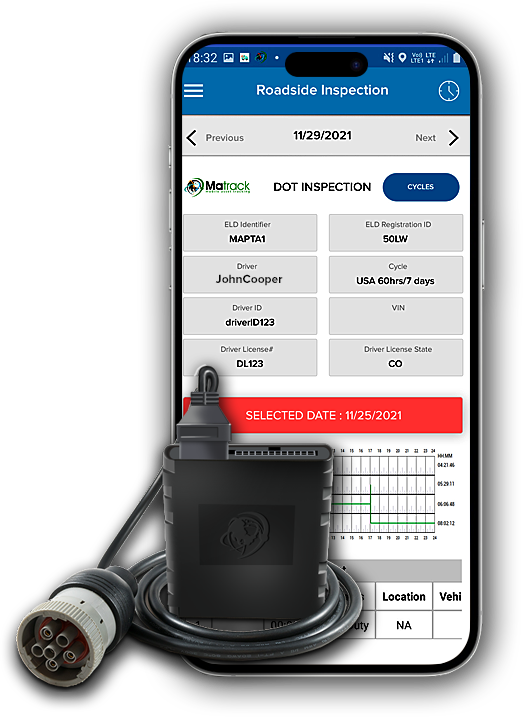 In today’s fast-paced world, efficient and effective fleet management has become more critical than ever. As businesses strive to streamline operations and increase productivity, the role of technology in fleet management cannot be overstated. One of the key technological advancements shaping the industry is the advent of Electronic Logging Devices (ELDs). This article aims to provide an in-depth look into the current state of fleet management, the role of ELDs in modern practices, emerging technologies that promise to shape the future of the industry, and how fleet managers can prepare for this future.
In today’s fast-paced world, efficient and effective fleet management has become more critical than ever. As businesses strive to streamline operations and increase productivity, the role of technology in fleet management cannot be overstated. One of the key technological advancements shaping the industry is the advent of Electronic Logging Devices (ELDs). This article aims to provide an in-depth look into the current state of fleet management, the role of ELDs in modern practices, emerging technologies that promise to shape the future of the industry, and how fleet managers can prepare for this future.
Current State of Fleet Management
Historically, fleet management was a manual and labor-intensive process, leaving ample room for errors and inefficiencies. However, the rapid advancements in technology over the years have revolutionized the industry. Today, fleet management is a tech-driven field that leverages various software and devices to ensure efficient operations.
One of the most significant advancements in this realm is the introduction of Electronic Logging Devices (ELDs). These devices have fundamentally changed the way fleet managers monitor and control their operations. They automatically record a vehicle’s driving time, providing accurate Hours of Service (HOS) records. By doing so, they not only ensure compliance with regulations but also help in identifying operational inefficiencies.
However, the implementation of ELDs is not without its challenges. The initial investment, training requirements, and resistance from drivers are some of the hurdles that fleet managers often face.
Role of ELDs in Modern Fleet Management
ELDs have become an integral part of modern fleet management practices. They offer numerous benefits, from improved compliance and increased safety to enhanced operational efficiency.
ELDs automatically record driving time, eliminating the need for manual entry and reducing the chances of errors. They provide accurate HOS records, ensuring compliance with regulations, and reducing the risk of penalties and fines.
Moreover, ELDs provide valuable data that can help fleet managers identify and rectify operational inefficiencies. For instance, they can highlight instances of excessive idling or aggressive driving, allowing managers to take corrective action and improve fuel efficiency.
Several companies have successfully implemented ELDs and witnessed significant improvements in their operations. For instance, Fluid Truck, a Denver-based company, has effectively integrated ELDs into its operations, resulting in improved safety and efficiency.
Beyond ELDs: Emerging Technologies and Trends
While ELDs have brought about substantial improvements in fleet management, they are just the tip of the iceberg. Several other technologies and trends are set to shape the future of the industry.
Artificial Intelligence (AI), Internet of Things (IoT), and autonomous vehicles are among the key technologies poised to revolutionize fleet management. These technologies can work in tandem with ELDs to provide more in-depth insights and automate various processes, further enhancing efficiency and productivity.
For instance, AI can analyze the vast amounts of data generated by ELDs and other devices to generate actionable insights. It can predict vehicle maintenance needs, optimize routes, and even analyze driver behavior to improve safety.
Meanwhile, the IoT allows for real-time tracking and monitoring of vehicles, providing fleet managers with a bird’s-eye view of their operations.
What is the Future of Fleet Management: Predictions and Expectations
With the rapid advancements in technology, the future of fleet management promises to be exciting and transformative. ELDs will continue to play a crucial role in this future landscape, providing the foundation for many of the emerging technologies.
As the demand for efficient and sustainable operations continues to grow, electric vehicles are expected to become a significant part of fleets. This shift towards electric vehicles will not only help companies reduce their carbon footprint but also lead to cost savings in the long run.
Autonomous vehicles, while currently in the testing and development stage, also hold immense potential. They promise to improve efficiency, safety, and productivity, and could potentially solve the issue of driver shortages.
Recommendations for Fleet Managers
According to YourBestFleet, As the fleet management landscape continues to evolve, staying ahead of the curve is crucial. Here are some recommendations for fleet managers to prepare for the future:
- Integrating New Technologies: As new technologies such as AI, IoT, and autonomous vehicles become more prevalent, integrating them with existing ELD systems will be crucial. This integration will allow fleet managers to leverage the full potential of these technologies and enhance their operations.
- Training and Education: As the use of technology in fleet management increases, ensuring that staff is adequately trained and educated is essential. This training will ensure smooth implementation and usage of new technologies.
- Investment and Infrastructure: Implementing new technologies often requires significant investment and infrastructure upgrades. Fleet managers should plan for these requirements and allocate resources accordingly.
Conclusion
The future of fleet management promises to be exciting and transformative, with ELDs at the forefront of this evolution. As technology continues to advance, fleet managers will need to stay ahead of the curve, embracing new technologies and trends to streamline their operations and stay competitive. By doing so, they can ensure that their fleets are not just ready for the future, but are actively shaping it.










